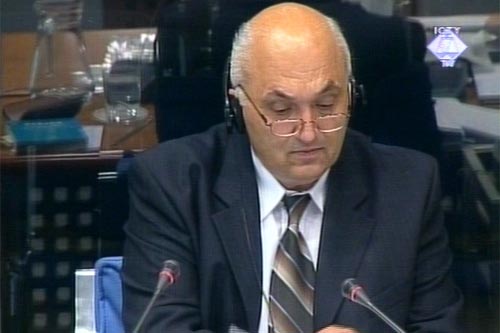Home
MILOSEVIC: "SOMEONE ELSE SHOULD BE INDICTED "
Noting that crimes were committed against Serbs and Albanians after the arrival of KFOR in Kosovo, Slobodan Milosevic said today that someone else, not he, “should be indicted if the Tribunal really were a court of justice and if the Office of the Prosecutor really were prosecutors…”
 Bogoljub Janicevic, defense witness for Milosevic
Bogoljub Janicevic, defense witness for Milosevic For the umpteenth time since the beginning of Milosevic’s defense case, Judge Robinson reminded him that “this case is not about the NATO air strikes and their consequences,” but about the specific crimes committed, according to the indictment, in Kosovo in the first half of 1999 by Serbian security forces.
Milosevic, however, is not of that opinion. For the umpteenth time since the beginning of his case, he explained that the Albanian population had been “fleeing from NATO bombs”, not from the “terror inflicted by the Serbian security forces”, as the prosecutor contends. Furthermore, Milosevic claims, the houses, mosques and other buildings in the Albanian villages were destroyed or burned by NATO bombs, not in the attacks the prosecutor blames on the Serbian forces. Finally, the Albanians who were killed – according to Milosevic – were “not civilians, but KLA terrorists, who were killed in combat against the Serbian security forces”.
Defense witness Bogoljub Janicevic confirmed all those arguments of the accused. At the time relevant for the indictment, he was the police chief in Urosevac. He illustrated his claims with examples from his area of responsibility, which included the village of Kotlina. According to the indictment, the Serbian forces killed 22 civilians in that village, throwing their bodies into a pit or a well on a nearby hill. Janicevic claims that those were not civilians but terrorists who had attacked the military and the police from the bunkers. They were subsequently surrounded and killed in combat.
At the end of Janicevic’s examination-in-chief, which took four days, Milosevic noted that crimes were committed against the Serbs and Albanians after the arrival of KFOR in the summer of 1999, concluding that someone else, not he, “should be indicted if the Tribunal really were a court of justice and if the Office of the Prosecutor really were prosecutors…” He tried to say something else, but Judge Robinson switched off his microphone.
At the beginning of the cross-examination, prosecutor Nice asked Janicevic why he failed to mention, while presenting his CV, that he had been a deputy in the Serbian Assembly as a member of Milosevic’s Socialist party of Serbia (SPS) between 1995 and 1999. The witness maintained he had mentioned that, but Judge Bonomy noted he for one did “not remember having heard it”.
The first part of the cross-examination focused on the maps where the witness plotted the “development” of the incident in Racak on 15 January 1999. It turned out that the maps had been drawn three weeks ago, immediately before the witness’s departure for The Hague and that he had been working on them together with Milan Lecic, who had commanded the police company that had participated in the operation in Racak. Janicevic explained that the maps reconstructing the course of the operation and the places and times of death of about 40 people (all terrorists, according to him) had been drawn “on the basis of the recollection of the police officers who had participated in the operation because all the contemporaneous documents relating to the events in Racak had been burned in the headquarters of the Interior Ministry in Pristina.”
Bogoljub Janicevic’s cross-examination will continue tomorrow.
Linked Reports
- Case : Milosevic Slobodan - "Kosovo, Croatia and Bosnia"
- 2005-09-30 RACAK ATTACK TIMELINE
- 2005-09-30 “MISUSE OF PROCEDURE”
- 2005-09-29 MILOSEVIC EXPANDS ACCUSATIONS AGAINST ASHDOWN
- 2005-10-04 MANIPULATING THE RACAK VICTIMS
- 2005-10-05 MILOSEVIC USED UP TWO THIRDS OF THE TIME ALLOTTED FOR HIS DEFENCE
- 2005-10-12 MILOSEVIC RUNS OUT OF TIME
